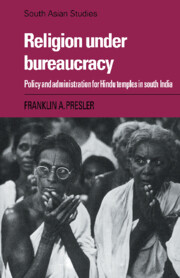Book contents
- Frontmatter
- Contents
- Dedication
- Preface
- Notes on sources, abbreviations and transliteration
- Map
- 1 Introduction: studying religion-state relations
- 2 The temple connection in the nineteenth century
- 3 Governance: the necessity for order
- 4 Governance: trustees and the courts
- 5 Economy: the problem of controlling land
- 6 Economy: the temple's weakness as landlord
- 7 Religion: purifying and organizing Hinduism
- 8 Religion: controlling the priesthood
- 9 Conclusion
- Bibliography
- Index
5 - Economy: the problem of controlling land
Published online by Cambridge University Press: 03 October 2009
- Frontmatter
- Contents
- Dedication
- Preface
- Notes on sources, abbreviations and transliteration
- Map
- 1 Introduction: studying religion-state relations
- 2 The temple connection in the nineteenth century
- 3 Governance: the necessity for order
- 4 Governance: trustees and the courts
- 5 Economy: the problem of controlling land
- 6 Economy: the temple's weakness as landlord
- 7 Religion: purifying and organizing Hinduism
- 8 Religion: controlling the priesthood
- 9 Conclusion
- Bibliography
- Index
Summary
The purpose of this and the next chapter is to explore the state's impact on temple economy, especially on temple landholdings. In no other area is the potential for conflict so great. Temple notables jealously guard their rights, while the state sees temple wealth, especially land, as a resource of such magnitude and importance that it simply must assert a jurisdictional interest.
The HRCE finds itself in the middle of this tension. On one side is the impulse to maximize state control, based on the premise that economy is by and large a “secular” matter. For example, it seems reasonable that temple funds should be handled in accordance with standardized accounting practices; the HRCE therefore is quite willing to control the budgeting process, standardize ritual fees and audit temple accounts. The department also has little difficulty with policies which effectively assimilate temple finances to the state's overall economic policy; it is therefore quite willing to regulate where and how temple funds should be invested.
However, when it comes to temple land the HRCE is not so sure. The HRCE agrees in a general way that the way in which temple land is used should not be contrary to broad public policy, especially land reforms. But it is reluctant to go to the full extent of having temple land handled as though it were simply a public resource. Land, after all, is the historical foundation of temples as institutions. It poses a distinct set of problems, and merits special treatment by state authorities.
- Type
- Chapter
- Information
- Religion under BureaucracyPolicy and Administration for Hindu Temples in South India, pp. 73 - 92Publisher: Cambridge University PressPrint publication year: 1988



